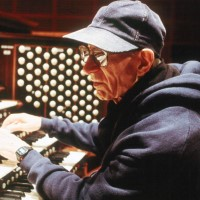Home » Jazz Musicians » Henry Brant
Henry Brant
Henry Brant is considered to be one of the principal pioneers of 20th Century spatial music, writing work in which the planned positioning of the performers throughout the hall, as well as on stage, is an essential factor in the composing scheme. Born in Montreal in 1913, he moved to New York in 1929, and spent the next 20 years composing and conducting for radio, film, ballet, and jazz groups, while also composing experimentally for the concert stage. In his 72 years of composing, Brant has garnered major international recognition, including numerous awards and accolades ranging from two Guggenheim Fellowships, the Prix Italia (being the first American to win this award), and the American Music Center's Letter of Distinction, to major international retrospectives of his work and the designation of a Henry Brant Week in Boston by Mayor Kevin White. Brant's work has spanned the spectrum of styles and genres from tone poems and chamber music to ritual oratorios and symphonies. The 1984 work Fire in the Amstel is written for four boatloads of 25 flutes each, four jazz drummers, four church carillons, three brass bands and four street organs. A more recent work Millennium 2 calls for a 35-piece brass orchestra, jazz combo, percussion ensemble, gospel choir, gamelan ensemble, bluegrass group, boy's choir, three pianos, organ and ten vocal soloists. At age 88, Brant remains a dynamic and prolific figure in modern music: his 1997 spatial work, Festive Eighty, had its first performance in Central Park in July, 1997, and in Vienna's Musikverein, the Vienna Radio Orchestra performed the premiere of Brant's completion of Schubert's B minor Symphony on October 14, 1997. Brant turned 88 on September 15, 2001, has not decided to call it quits. On the contrary, three months after this benchmark he appeared onstage as organist in his new work Ice Field, for over 100 orchestral musicians, as Michael Tilson Thomas and the San Francisco Symphony presented its world premiere at Davies Symphony Hall, December 12, 13, 14, and 15. The work was commissioned for the SFS by Other Minds, with support from the Rockefeller Foundation’s Multi-Arts Production Fund and A Gathering of Other Minds. Read Charles Amirkhanian's interview with Brant, which took place at Davies Hall in August, 2001. On April 8, 2002, Brant was awarded the Pulitzer Prize for Music for Ice Field. Read about it here. Henry Brant died peacefully at his home in Santa Barbara, California, April 26, 2008.
Read moreTags
Henry Brant, Experimental Composer on Grand Scale

Source:
Michael Ricci
Henry Brant -- an American maverick composer who added the dimension of space to music by placing musicians in nooks and crannies of concert halls, on boats floating down the Amstel River in Amsterdam or arrayed throughout sports arenas -- has died. He was 94. The Pulitzer Prize-winning composer died Saturday at his home in Santa Barbara, according to associates. Brant's pieces were always events tailor-made for specific sites. A typical example was “500: Hidden Hemisphere," commissioned in 1992 by ...
read more
Spatial Music Pioneer Henry Brant Featured in New CD Series

Source:
All About Jazz
Innova Recordings Releases Henry Brant: The Henry Brant Collection, Volume 3 St. Paul, MN -- America's senior experimental composer, 92-year old Henry Brant, heard Charles Ives's spatial work The Unanswered Question many decades ago. Brant has since composed over 100 pieces that similarly involve multiple groups of musicians spaced throughout the auditorium (or sometimes gym, park, church or canal). Innova Recordings has begun documenting some of these once-in-a-lifetime gargantuan works that often involve dozens of performers. The latest ...
read more












